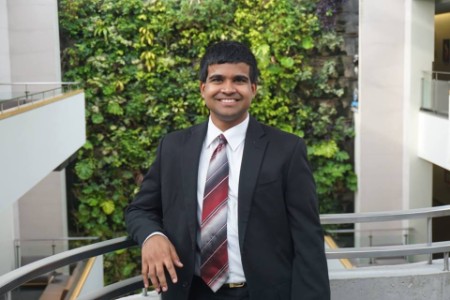co-authors: Dilshan Jayasinghe and Tammy Morris
A Neurodiversity Conversation:
Tammy Morris, EY Canada NCoE Network Leader, and Dilshan Jayasinghe, Intermediate Staff Accountant, Assurance - Toronto Audit Group (TAG) shared a conversation with us as Dilshan shared his EY neurodiversity story.
TM: Hi Dilshan, thank you for joining. Can you share your career journey and what brought you to EY?
I started at EY in September of 2019, so not long ago. I had an opportunity to hear about EY’s D&I efforts when I was in my first year at the University of Guelph-Humber. I still remember having a coffee meeting with the former Diversity and Inclusiveness Coordinator at EY in 2015, when EY was at the Bay Street location. Learning about what EY does for D&I meant a lot to me as a university student planning to pursue the CPA designation and enter the workforce after graduation. Since I started at EY everyone made me feel welcomed.
TM: In 2020 EY Canada began expanding understanding and a network around Neurodiversity, with the launch of the Neurodiversity Centers of Excellence (NCoE). How did that news impact you?
I heard about the Neurodiversity Centre of Excellence happening in the USA. But hearing the news of the NCoE coming to Canada, particularly in the Toronto office impacted me in a very positive way. I felt it really demonstrated the firm’s commitment to those with neuro-diverse backgrounds. Since grade 10 in my high school years and through my university years I have organized different initiatives to expand awareness surrounding autism.
TM: We know disclosure is a personal and context-dependent decision. Can you share your journey and what contributed to those decisions for you?
If I could go back even further, I can share my story. The first time I heard the term ‘autism’ was in elementary school. I remember school staff sitting me down with my parents and explaining that they thought it was important for me to know that I had autism before I graduated elementary school. Immediately I worried about being judged by my peers if people knew about my diagnosis. I had received speech therapy for two years back in my kindergarten years and had been encouraged by my peers, parents, and teachers to work hard and to improve.
When I heard the list of characteristics of autism from my parents, many things began to make sense for me. There were people who had preconceived notions about the functioning levels of people with autism, thinking that there is only one side of the spectrum. They didn’t believe me when I shared my diagnosis with them, especially during my high school and university years. Therefore, I knew early on that people needed to learn more about autism. Even professionals training for careers in this space were anxious to learn from me and learn from my perspective.
During my job interview with EY, the interview team noted that I had included volunteering and coordinating events around World Autism Awareness Day on my resume and were impressed by that work. Sharing my diagnosis has given meaning to why I have decided to be involved with many initiatives for World Autism Awareness Day. After I was hired, I disclosed again on my new hire paperwork. Lastly, I disclosed during my first conversation with my counselor. Since then this topic hasn’t come up, outside of reaching out to you and the NCoE team.
TM: Did you require any support?
I work across many different engagement teams through my work. I haven’t required any accommodations, and I perform the work as well as my peers, I am confident of that. I am self-aware that I tend to ask a lot of questions. As I’ve transitioned from a Junior Staff Accountant to an Intermediate Staff Accountant, there are more expectations involved. However, I know that given my careful attention to detail, and the fact that each client engagement that I have been on is different, I do continue to ask questions and to confirm that I am meeting everyone’s needs.
TM: Do you have any advice you might share with other neurodivergent adults entering EY, or the workforce more broadly?
Of course, one must use discretion, but know that most people are there to listen and offer support, especially at EY. Being worried about entering the workforce when you have a neuro-diverse background is okay and there is nothing wrong with that. It’s always important that you show confidence of who you are and to always remember about the journey you took to get to wherever you end up. Don’t be afraid of who you are, and you should know that you are going into the workforce to do amazing things
TM: We’ve developed a transformative roadmap for EY Canada around building a neuro-inclusive workplace. The hope is that future generations will have even greater understanding and celebrate cognitive differences, because of the work that EY is doing within and beyond the firm. What do you personally hope to see down the road, let’s just call it in a ‘Better Working World’?
I hope that everyone at EY feels a sense of belonging, whether they have autism, ADHD or any other cognitive difference. Too often these differences are associated with weakness when they should be associated with determination. I hope that in the future all who are neuro-diverse are recognized for being capable and major contributors to the firm, and to society. In addition, I hope to see neurodiversity play a role in ESG where having neurodiversity inclusiveness can help strong corporate performances.


